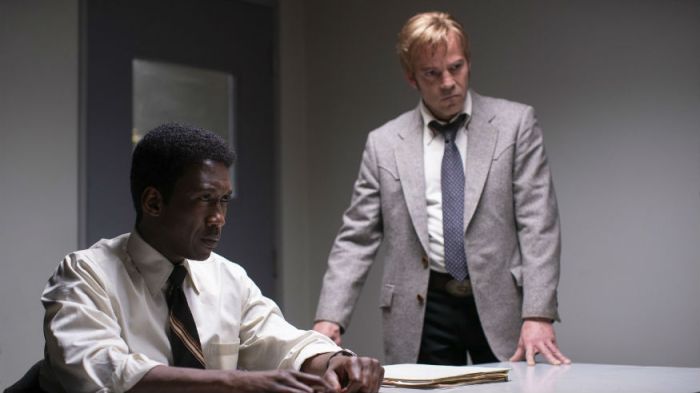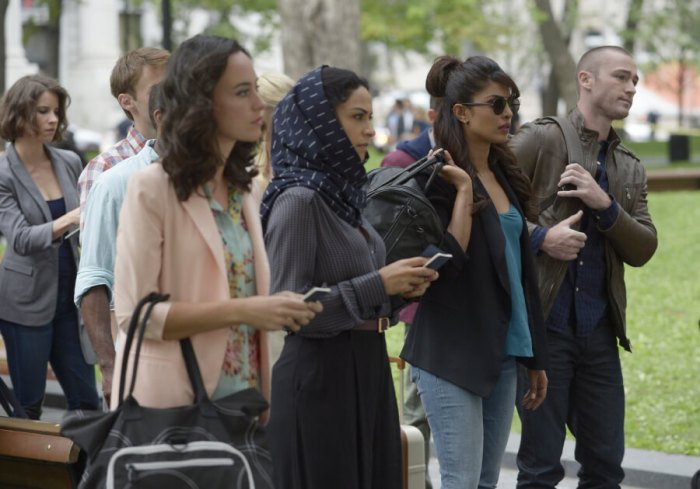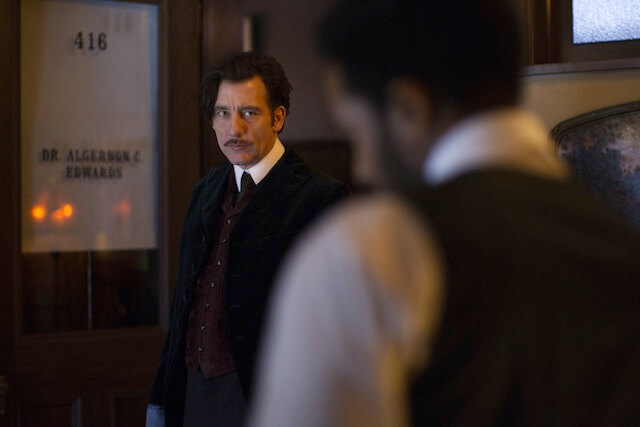‘The Knick’ The Thack is back (on heroin)! After an entire single episode clean, Clive Owen’s brilliant ex-junkie surgeon Dr. Thackery re-junkied himself. The tense opening found him making all the classic moves of someone leaping off the wagon: the paranoid jitters as he hurriedly breaks out his gear; the shifty-eyed shame after he’s done the deed; that look of relief and ecstasy as you can essentially see the drugs pouring down through his system. Having sworn to the hospital board he’d stay pure, Thack knew not to create another puncture hole in his arm. So he Hoovered it up his nose. Back to being brilliant. Parts of “The Best with the Best to Get the Best” felt a bit like a throwback to the last season, before characters cleaned up or split up. Old flames Cornelia (Juliet Rylance) and Dr. Edwards (Andre Holland) found themselves alone in a Knick office suddenly caressing hands, which turned out to be a slippery slope into toungey kissing. Others find themselves reverting to earlier stages. Dr. Chickering (Michael Angarano), who decamped from the Knick, is now on a lower rung working for Thack rival Dr. Zinberg (Michael Nathanson), who assured him they are a bit more “formal.” Nurse Elkins (Eve Hewson), burnt by Thack, is trying to be a good girl again, turning down a nice young man’s advances and trying to get back in her visiting preacher father’s (Stephen Spinella) good graces. RELATED: “Quantico” recap: Season 1, Episode 5, “Found” The last plot thread leads to some of the episode’s bigger showstoppers. First there was a scene where Elkins launches into a brutally honest and, in retrospect, deeply misjudged confessional about all the naughty stuff she and Thack used to do, all while her father watched. Then there was the aftermath: her dad, rather than proud of her, is furious and ashamed. He starts beating her. Eventually Elkins hikes up her skirt and kneels down, perhaps leading us to think something worse than the mere spanking she gets is en route. This was a particularly feminist episode, from the physical and emotional abuse heaped on Elkins to Cornelia’s husband giving her a post-coital lecture for wanting to help out jailed nun-abortionist Sister Harriett (Cara Seymour). There were the parents of a woman who OD’d; when Thack tries to procure her corpse for his research in addiction (guess he was semi-serious about it after all), the husband assures him, “My wife is not in a position to think rationally.” There was Chickering’s run-in with a journalist — a lady journalist! — in his new workplace, who flirted by making fun of gender biases she faces on a daily (hourly? minutely?) basis. “The Knick”’s writing can sometimes be on-the-nose, but as with last week — which slyly commented on how prejudice against and ignorance of drug addicts has not improved much since 1900 — these scenes didn’t wind up flattering us for not being like them. The cruelties — sometimes overt, sometimes subtle and unthinking — these characters face continue in ways into today. There were other forms of prejudice that might be as old-timey as the Knickerbocker itself but which still persist in some form in 2015. The Irish are no longer a cultural pinata, but here was Sister Harriett being lectured by a judge, who thinks she’s “shown the true murderous nature of your kind.” Did Donald Trump write that? Likewise, even today’s racistiest racists know not to touch eugenics. Early into this episode, Dr. Gallinger (Eric Johnson), whose bigotry has been exacerbated by how Edwards has basically replaced him at the Knick and in Thack’s heart, goes to a swanky rich guy party, where he stumbles upon a conversation by smoking, boozing rich guys talking about the dangers of miscegenation and rooting out “the worst of our species.” They smirk the smirk of those who think they’re onto something before everyone else. “Colleges and universities are adding eugenic courses in droves,” one of them crows, and we can snicker at how wrong they are — before realizing that their thinking would stay strong for another several decades and, in many ways, never fully go away. RELATED: Lucy Lawless remembers hating the first “Evil Dead” If some of this episode seemed “classic” “The Knick” (as in, harking back to episodes that appeared a year ago), it continued with its even more experimental shooting style. Director/cinematographer Steven Soderbergh (still crediting himself as Peter Andrews after all these years) had some nifty one-shot tricks up his sleeve. Cornelia’s impromptu roll in the hay with her husband was shot entirely from a high angle in the corner, like a 1900 form of surveillance video. Elkins being berated by her dad, the camera stays on her and keeps in a frightening blur — like he was some movie monster Soderbergh was too scared to show in focus. And Thack’s inebriated night-out — with back-alley snorting and sex — was done with some disorienting long lens work. The handmade feel of this show is one of its strongest aspects. Sometimes the content comes up a touch short, but it’s fun watching Soderbergh just being a director — someone just finding the best and most stylish way to shoot what someone else has written. Token stray observations: Read our previous “Knick” recaps: Follow Matt Prigge on Twitter @mattprigge
Season 2, Episode 3, ‘The Best with the Best to Get the Best’
— After an abscess in the first episode and last week’s aborted eye surgery, this one took a relative break from operation gore. There was a pretty nifty/nasty close-up of tumor surgery, so good on ya.
— Angarano is an actor easy to take for granted, and the same goes for Chickering as a character. In the actor’s hands, Chickering’s attempt to break the ice at a largely Jewish hospital (“I’m not a Jew. But I’ve worked on a few”) managed to be at once clueless, endearing and even a little charming.
— There was also a last-minute bombshell for Edwards. To convey his sudden vulnerability, Soderbergh blows off the usual Rule of Thirds — the dictum that, in close-ups and medium shots, one should place bodies so that they take up most of the frame — so that Edwards stands there with ample headroom. “King’s Speech” and “Les Miserables” director Tom Hooper gets crap for doing this a lot, but rightly so — he does it for no reason than because those shots are unusual. But do it sparingly and exactingly, as Soderbergh does here, and it can be a thing of beauty, conveying all you need to say about a character and a scene through nothing more than framing.
— Season 2, Episode 2
— Season 2, Episode 1























